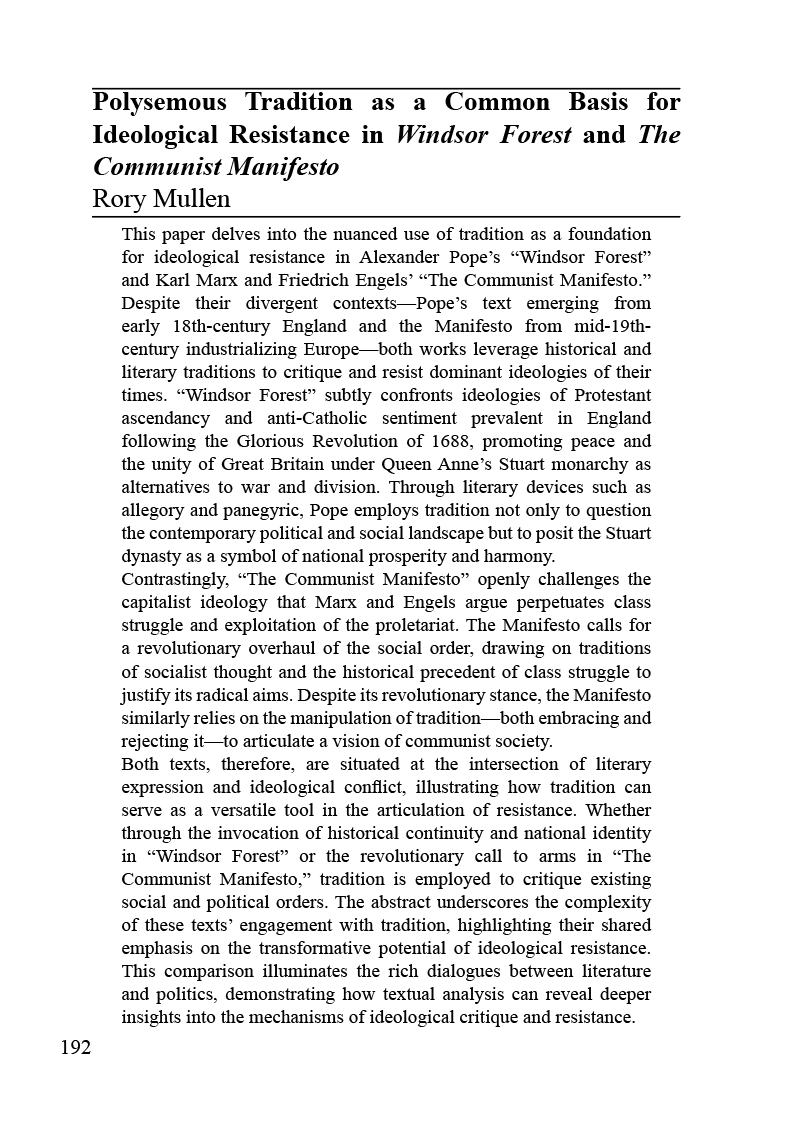Polysemous Tradition as a Common Basis for Ideological Resistance in Windsor Forest and The Communist Manifesto
DOI:
https://doi.org/10.36399/GroundingsUG.15.124Keywords:
Windsor Forest, Alexander Pope, Communist Manifesto, Karl Marx, Friedrich Engels, Tradition, Ideological Resistance, Political HistoryAbstract
This paper delves into the nuanced use of tradition as a foundation for ideological resistance in Alexander Pope’s “Windsor Forest” and Karl Marx and Friedrich Engels’ “The Communist Manifesto.” Despite their divergent contexts—Pope’s text emerging from early 18th-century England and the Manifesto from mid-19th-century industrializing Europe—both works leverage historical and literary traditions to critique and resist dominant ideologies of their times. “Windsor Forest” subtly confronts ideologies of Protestant ascendancy and anti-Catholic sentiment prevalent in England following the Glorious Revolution of 1688, promoting peace and the unity of Great Britain under Queen Anne’s Stuart monarchy as alternatives to war and division. Through literary devices such as allegory and panegyric, Pope employs tradition not only to question the contemporary political and social landscape but to posit the Stuart dynasty as a symbol of national prosperity and harmony.
Contrastingly, “The Communist Manifesto” openly challenges the capitalist ideology that Marx and Engels argue perpetuates class struggle and exploitation of the proletariat. The Manifesto calls for a revolutionary overhaul of the social order, drawing on traditions of socialist thought and the historical precedent of class struggle to justify its radical aims. Despite its revolutionary stance, the Manifesto similarly relies on the manipulation of tradition—both embracing and rejecting it—to articulate a vision of communist society.
Both texts, therefore, are situated at the intersection of literary expression and ideological conflict, illustrating how tradition can serve as a versatile tool in the articulation of resistance. Whether through the invocation of historical continuity and national identity in “Windsor Forest” or the revolutionary call to arms in “The Communist Manifesto,” tradition is employed to critique existing social and political orders. The abstract underscores the complexity of these texts’ engagement with tradition, highlighting their shared emphasis on the transformative potential of ideological resistance. This comparison illuminates the rich dialogues between literature and politics, demonstrating how textual analysis can reveal deeper insights into the mechanisms of ideological critique and resistance.
References
Marx, Karl and Engels, Friedrich. (1992). The Manifesto of the Communist Party (Oxford world’s classics). Edited by David McLellan. New York: Oxford University Press.
Pope, Alexander (1968): Windsor Forest, in The Poems of Alexander Pope, ed. John Butt. London: Methuen.
Ahmad, Aijaz. “The Communist Manifesto in Its Own Time, And in Ours.” Nineteenth-Century Literature Criticism, edited by Lynn M. Zott, vol. 114, Gale, 2003. Literature Resource Center.
Bennett, Andrew. Royle, Nicholas. (2009) An Introduction to literature criticism and theory. 4th edn. Harlow, UK: Pearson/Longman.
Berman, Marshall, ‘Tearing Away the Veils: The Communist Manifesto,’ Dissent: A Quarterly of Politics and Culture (2011).
Bookchin, Murray ‘The Communist Manifesto: Insights and Problems’, New Politics 6 (1998).
Hamrick, Wes. “Trees in Anne Finch’s Jacobite poems of retreat.” Studies in English Literature, 1500-1900, vol. 53, no. 3, 2013, Gale Literature Resource Center.
Israel, Jonathan I. (2003). The Anglo-Dutch Moment: Essays on the Glorious Revolution and Its World Impact. Cambridge: Cambridge University Press.
Lyon, Janet. Manifestoes: Provocations of the Modern, Ithaca: Cornell University Press, 1999.
Rogers, Pat. “The Politics of Style.” published in Essays on Pope, Cambridge: Cambridge University Press, 1993.
Rogers, Pat. The Symbolic Design of Windsor-Forest: Iconography, Pageant, and Prophecy in Pope’s Early Work. Newark: University of Delaware Press, 2004.
Wheeler, David. (2010). The Personal and Political Economy of Alexander Pope’s “Windsor-Forest”. South Atlantic Review, 75(4), 1-20. Retrieved from http://www.jstor.org.ezproxy.lib.gla.ac.uk/stable/41635650
Young, Brian: ‘Pope and Ideology’, in The Cambridge Companion to Alexander Pope, ed. Pat Rogers (Cambridge: Cambridge University Press, 2007).

Downloads
Published
Issue
Section
License
Copyright (c) 2024 Rory Mullen

This work is licensed under a Creative Commons Attribution 4.0 International License.
The CC BY 4.0 license is a Creative Commons license. This is a non-copyleft free license that is good for art and entertainment works, and educational works. It is compatible with all versions of the GNU GPL; however, like all CC licenses, it should not be used on software. People are free to: Share — copy and redistribute the material in any medium or format; Adapt — remix, transform, and build upon the material for any purpose, even commercially. The licensor cannot revoke these freedoms as long as you follow the license terms. But they must conform to the following terms: Attribution — You must give appropriate credit, provide a link to the license, and indicate if changes were made. You may do so in any reasonable manner, but not in any way that suggests the licensor endorses you or your use. No additional restrictions — You may not apply legal terms or technological measures that legally restrict others from doing anything the license permits.
Please check individual article PDF copies to see if any additional restrictions apply.







